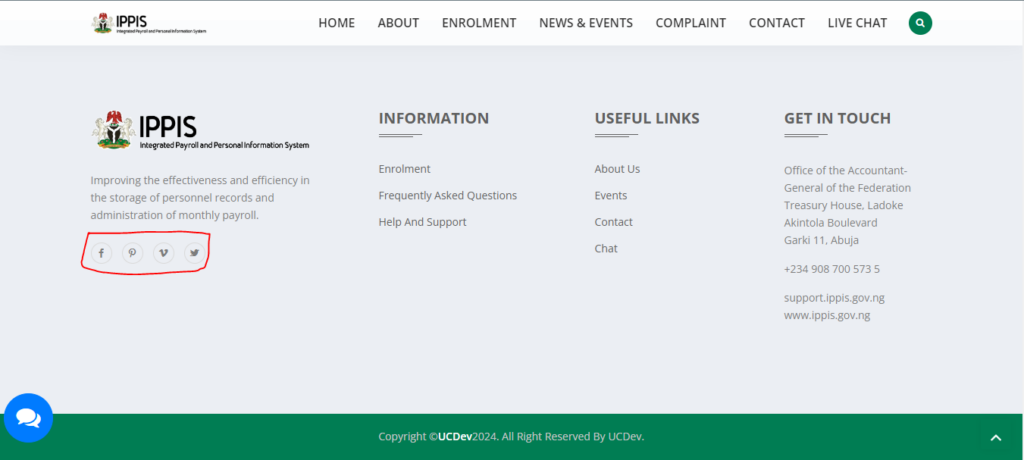A shocking revelation has emerged that the IPPIS Payroll Validation section on the Office of the Accountant-General of the Federation (OAGF) website has been hijacked by an unknown hacker. Furthermore, the personal data of federal government employees stored on the IPPIS Secretariat website is vulnerable to attack due to an expired Secure Site Layer (SSL) feature.
Investigations by FIJ have uncovered that sensitive information, including names, phone numbers, email addresses, dates of birth, and employment details, has been left unsecured on the website. Although FIJ cannot publish the exposed data, it is clear that the breach poses a significant risk to the privacy and security of government employees.
Moreover, the IPPIS Payroll Validation web section has been compromised, redirecting users to an unreachable webpage with an Icelandic-registered web address. This raises concerns about the potential motives behind the hijacking and the security of the OAGF’s online platforms.
This incident highlights the urgent need for the OAGF and IPPIS Secretariat to address their cybersecurity vulnerabilities and protect the personal data of government employees.

SOCIAL MEDIA HANDLES HIJACKED
FIJ further found that the secretariat’s social media handles had been hijacked by a cyber attacker.

Like many organisations, the secretariat has some social media handles, including on X and Facebook, and linked them to the website.
Clicking on the X and Facebook links takes one to different pages, indicating that a cyber attacker has hijacked them.

For instance, the Facebook link led to a page named “DevItems,” a web design firm that last posted on February 9, 2020, and is supposedly based in Atlanta in the United States.
The X page takes one to a suspended handle (@devitemsllc), a handle that obviously belonged to the same web design firm.
Obviously, the health of these websites had been compromised. From FIJ’s observation, there is a strong indication that the information stored on them could have been exploited by internet criminals.
IMPLICATION IN HINDSIGHT

Per the Nigeria Data Protection Act, personal data is any information relating to an individual who can be identified or is identifiable, directly or indirectly, by reference to an identifier such as a name, an identification number, location data, an online identifier or one or more factors specific to the physical, physiological, genetic, psychological, cultural, social, or economic identity of that individual.
To understand the sensitivity of such information as a full name, date of birth, phone number and email address, people naturally use them for banking and other financial transactions.
In the case of government workers, the information could be linked to their salary accounts and other digital accounts. With their sensitive information left unguarded by the government, they are open to privacy breaches.
Failure to protect such information, according to the source who provided the tip-off, an attacker could do many things with it, such as phishing. Those credentials are also attached to their financial data because whatever information they provide must correspond with their various financial institutions. In short, it won’t augur well should an attacker have access to those credentials.
In October, some workers lamented how some portions of their salaries were deducted to service loans they did not obtain.
“I didn’t collect a loan from any of such loan accounts. It is very obvious that this loan account committed this fraud in collaboration with some staff of the IPPIS in Abuja. I took a loan which has been offset since April 2023. I do not owe anyone,” an Ondo State-based government worker told FIJ in October.
Last November, FIJ also reported how N129,650 was deducted from a worker living in Lagos State. “I can’t comprehend IPPIS’s actions with my funds during these challenging times. After deducting the money from my account, IPPIS failed to pay Credit Direct what I owed. I am exhausted,” he told FIJ.
In all of those reports, the secretariat never responded to FIJ’s requests for comment.
POOR DATA MANAGEMENT BY PUBLIC INSTITUTIONS
A snapshot of the unresponsive Contact Us form on OAGF’s website.
Despite the existence of laws and regulations requiring adequate maintenance of websites and the protection of citizens’ data, the failure of government institutions to effectively discharge this responsibility is public knowledge.
The National Information Technology Development Agency (NITDA) and the Presidential Enabling Business Environment Council (PEBEC) statutorily mandate government institutions to maintain a quality website safe for information-keeping and also enable citizens to demand quality service delivery.
Section 7.2 of the NITDA guidelines, which applies to government websites, reads in part: “Government Institutions shall: i. ii. iii. Commit to a continuous process of maintaining the security of Web Servers to ensure continued security. Use authentication and cryptographic technologies as appropriate to protect certain types of sensitive data with differing access privileges. It is recommended that SSL be used for any cryptographic implementation.”
From the police to the presidency, surprisingly, a pattern of poor management of website channels has been created.
In April, the official website of the State House was only restored to normalcy after FIJ reported its SSL had expired for two weeks without renewal. A similar story was written about the official website of the Nigeria Police Force (NPF) in the same month.
Data breaches, further exposed how citizens’ national identification data had been illicitly harvested and commercialised by XpressVerify, a dodgy private website.
The media backlash that followed forced the National Identity Management Commission (NIMC), Nigeria’s identity management agency, to disclaim any responsibility for the breach and promise to investigate the incident. This was after the website host had deactivated the site’s domain name.
FIJ’s findings could explain why some workers have been reporting unexplained deductions from their salaries with no satisfactory word from the secretariat or even the OAGF.
In a report on February 8, Idris Abdulkabir, a civil servant based in Kaduna State, told FIJ his unsolicited loan deductions from his salary could lead to his death.
“If I die from overthinking, please hold IPPIS responsible for removing my money indiscriminately and sending it to a loan agency I know nothing about,” Abdulkabir said.
The report also spotlighted the experiences of some other workers affiliated with federal medical establishments including the University College Hospital, Ibadan; the National Orthopaedic Hospital, Kano; and the Ahmadu Bello Teaching Hospital, Zaria.

The OAGF had no phone number on its website and an inquiry form on the ‘Contact Us’ section of the website was unresponsive when FIJ attempted to send some questions through it.
A list of questions sent via an email address seen on the website had not been acknowledged at press time.
For the IPPIS Secretariat, the customer care number +2349087005735 listed on its website was


